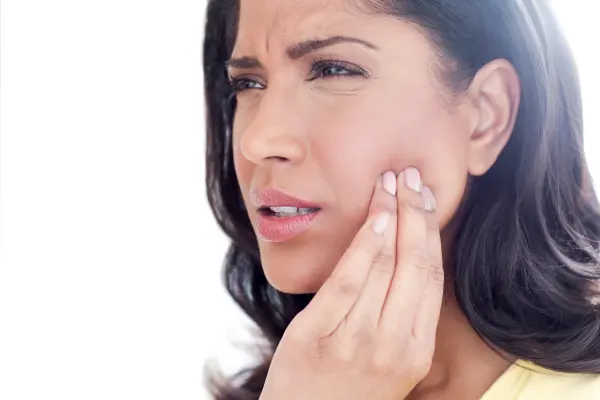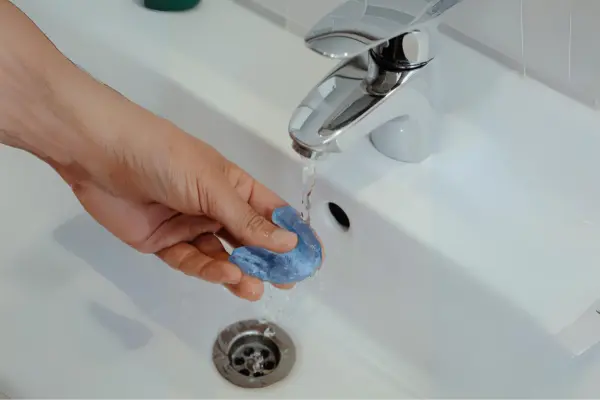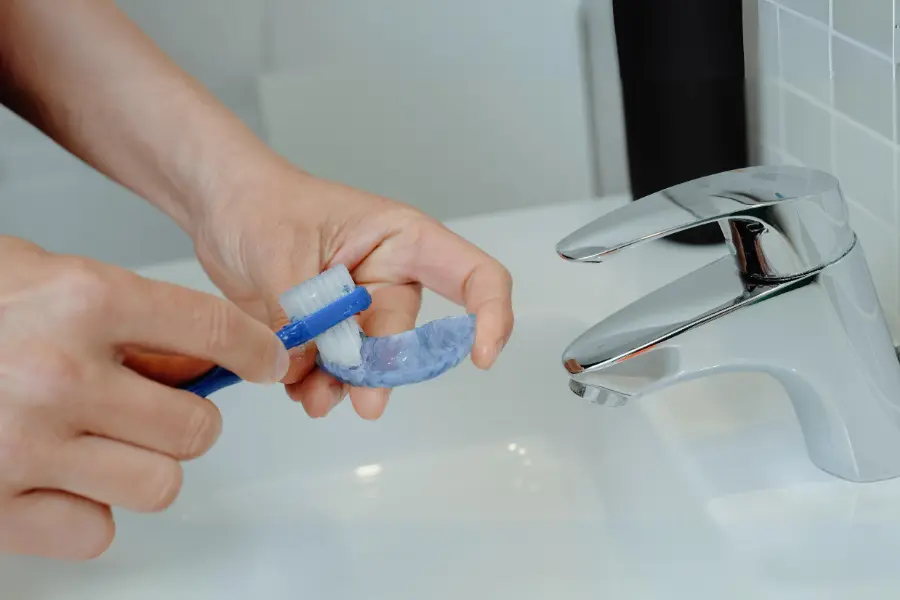Just like brushing your teeth is important, so is understanding how to clean a night guard!
Even though you brush your teeth on a regular basis, there are still bacteria in your mouth, thus maintaining dental hygiene is necessary, but cleaning your night guard is even more important. Taking good care of your night guard will prolong its life and reduce your chance of tooth decay.
Maintaining the cleanliness of your night guard is essential for keeping your teeth safe. Let’s explore the benefits of cleaning your night guard after each usage as well as the best way to clean your night guard.
What Are Night Guards?
Before going into the maintenance of night guard, let’s actually talk about what it is and what it does for your teeth first. So, a night guard is a small, custom-made device that you wear over your teeth while you sleep. It’s usually made of a soft or firm plastic material and fits snugly over either your top or bottom teeth. The main job of a night guard is to protect your teeth from grinding and clenching, which can happen during sleep. This teeth grinding is known as bruxism which causes tooth damage, jaw pain, and headaches.
Teeth Grinding & Jaw Clenching

If you notice any of the symptoms listed below, it might be a good idea to see your dentist to find out if you have Bruxism. It’s important for your dentist to regularly check for signs of Bruxism during your visits, as they can quickly spot any wear and tear or damage to your teeth. The symptoms include:
- Pain in your face
- Headaches
- Earaches
- Jaw pain or stiffness
- Broken or cracked dental fillings
- Increased sensitivity in your teeth from cracks or breaks
Reasons to Keep a Clean Night Guard
Keeping your night guard clean is very important for a few key reasons:
- Stop Germs from Growing Your night guard sits in your mouth all night, and it can start to collect germs because it’s warm and wet in there. Cleaning it well stops these germs from building up, that way you’ll avoid bad breath and infections. Just like you wouldn’t wear the same socks every day without washing them, you shouldn’t use your night guard without cleaning it!
- Keep Your Teeth Healthy: If your night guard is dirty, it can help make more acid in your mouth. This acid can wear down your teeth and cause cavities which are caused by tooth decay from various factors such as bacteria, poor dental hygiene, and sugary foods. Without proper cleaning, the bacteria on your teeth can intensify, further damaging the enamel and causing cavities.
- Keep Your Gums Healthy: Not cleaning your night guard can also lead to sore and swollen gums, a condition called gingivitis. It can turn into a serious gum disease if it gets out of hand. Regular cleaning keeps your gums happy and healthy, avoiding any gum related diseases.
- More Comfortable to Wear: A clean night guard feels better in your mouth. It fits right and won’t feel gross when you put it in at night. You won’t feel disgusted or icky by wearing it and that’s enough reason to make you wanna wear it regularly.
- Make It Last Longer: Regular cleaning helps your night guard last longer. This means you won’t have to replace it as often, saving you money and hassle. It’s simply good budgeting and being sensible about it.
Cleaning your night guard doesn’t take much time, but it does make a big difference. It keeps your mouth healthy, makes sure your night guard is comfortable to use, and saves you money in the long run. Plus, it’s also just nice to start each night with something clean and fresh.
The Best Ways To Clean A Night Guard

Now that we’ve talked about the reasons for cleaning a night guard, it’s about time we talk about the different ways you can clean your night guard. Remember, keeping your night guard clean is crucial for maintaining good oral hygiene and extending the life of the guard.
How to Clean Night Guards with Toothpaste
Cleaning night guard with toothpaste is a safe and effective for routine cleaning:
- Select the Right Toothpaste: Use a non-abrasive toothpaste, preferably one without harsh whitening agents, as they can scratch the night guard.
- Brush Gently: Take a soft-bristled toothbrush and apply a small amount of toothpaste. Gently brush all surfaces of the night guard to remove plaque and food particles.
- Rinse Thoroughly: After brushing, rinse the night guard under cool running water. Make sure all toothpaste is washed off to prevent any residue buildup.
How to Clean Night Guards with Mouthwash
If you’re wondering how to use mouthwash for cleaning night guard, then you can use it in the following way:
- Prepare the Solution: Use an antibacterial mouthwash for extra germ-killing power. Dilute the mouthwash with an equal part of water to reduce its intensity and prevent material damage.
- Soak Briefly: Submerge the night guard in the mouthwash solution for about 10 minutes. This will help kill bacteria and freshen up the guard.
- Rinse Well: After soaking, rinse the night guard thoroughly under water to remove any traces of mouthwash.
How to Clean Night Guards with Baking Soda
Baking soda for cleaning a night guard is a safe and effective method for deep cleaning:
- Make a Paste: Mix a tablespoon of baking soda with enough water to form a thick paste.
- Scrub Gently: Apply the paste to the night guard using a soft toothbrush. Scrub all surfaces gently to remove buildup.
- Rinse Off: Wash the night guard under cool water until all baking soda is removed.
Cleaning Night Guard Tablets
If you’re wondering how cleaning night guard tablets work then the answer is they are specifically designed for dental appliances like night guards:
- Dissolve the Tablet: Follow the instructions on the package, generally involving dissolving a tablet in a cup of warm water.
- Soak the Night Guard: Submerge the night guard in the solution for the time specified by the manufacturer, usually around 15 minutes.
- Rinse and Dry: Remove the night guard, rinse it well, and let it air dry on a clean towel.
Vinegar and Hydrogen Peroxide
Cleaning night guard with hydrogen peroxide is also a popular method and can be used in the following way:
- Hydrogen Peroxide Soak: Soak the night guard in hydrogen peroxide for another 30 minutes to further disinfect and whiten it.
- Final Rinse: Rinse it under cool water and allow it to air dry.
Cold Water Soaks

Cleaning night guard with water is an effective way for quick daily cleaning, cold water can be surprisingly effective:
- Rinse After Use: Always rinse your night guard with cold water after each use. This removes immediate debris and saliva, preventing buildup..
- Soak: Occasionally, let your night guard soak in cold water for an hour with a bit of mouthwash or cleaning solution added for extra cleanliness.
Each method offers specific benefits, from deep cleaning with baking soda to quick freshening with mouthwash. Regular cleaning, regardless of the method you are using, will ensure your night guard remains in good condition, protecting your teeth effectively every night.
When to Replace Night Guard?
The fact that a night guard absorbs the full force of your jaw muscles every night means that even the best night guard will eventually need to be replaced. A night guard replacement depends on how you use your night guard including frequency of use, thickness, habit of teeth grinding, cleaning, and storage.
- Lots of Wear and Tear: If you notice that your night guard has deep scratches, cracks, or holes, it’s a sign that it’s worn out and not protecting your teeth as it should.
- Doesn’t Fit Right Anymore: Night guards can stretch or change shape over time. If yours feels loose or falls out during the night, it’s not doing its job properly.
- Feels Uncomfortable: If your night guard starts to hurt or feel uncomfortable, it could mean that it’s damaged or has become misshapen. This discomfort can make it hard to sleep and could hurt your teeth or gums.
- Bad Smells: A clean night guard shouldn’t smell bad. If you can’t get rid of a bad odor, even after cleaning it, there might be bacteria stuck deep in the material.
- Stains or Yellowing: If your night guard has stubborn stains or has turned yellow and you can’t clean it off, this might mean the material is breaking down. This can make the guard weaker and less effective.
- It’s Old: Night guards don’t last forever. Most need to be replaced every few years, depending on how often you use them and what they’re made of. Your dentist can check your night guard during regular visits and tell you if it’s time for a new one.
By keeping an eye on these signs, you can make sure your night guard is always in good shape and protect your teeth and jaw from damage.
Where to Find The Best Night Guard?
The best night guard is considered to be the one that is customized specifically for you. ALIGNERCO’s custom night guards are perfect for anyone looking to protect their teeth from grinding or clenching at night. Plus, AlignerCo makes it easy to get your custom guard right from home with their online ordering system, and they’re priced affordably, too starting from $125. They offer soft night guards, hard night guards and hybrid nightguards, each for your specific needs.
Final Thoughts
Keeping your night guard clean is essential not just for hygiene but for your overall oral health. Regular and thorough cleaning prevents the buildup of harmful bacteria and plaque, which can lead to oral issues such as bad breath, tooth decay, and gum disease. By sticking to a consistent cleaning routine, you can ensure that your night guard is effective in protecting your teeth and comfortable to wear.
FAQs
1. How often should I clean my night guard?
It’s important to clean your night guard after each use to maintain hygiene and functionality. This prevents the growth of bacteria that can cause bad breath and other oral health issues.
2. What is the best way to clean a night guard?
The best way to clean your night guard is to use a soft toothbrush and non-abrasive soap or toothpaste and gently brush the guard. To get rid of any residue, always give it a quick rinse under cool running water afterward.
3. Is it possible to clean my night guard with mouthwash?
Yes, you can assist in disinfecting your night guard by soaking it in non-alcoholic mouthwash for roughly ten minutes. Make sure you give it a good rinse afterwards to get rid of any mouthwash taste.
4. How can I get rid of stubborn stains off my night guard?
To loosen up tough stains, immerse the night guard in white vinegar for half an hour. Rinse it, then soak it in hydrogen peroxide for an additional thirty minutes to give it an even deeper clean and brighter appearance.
